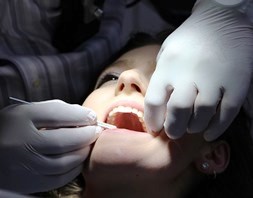Dental Hygiene Courses
How to Select the Best One Near State College Pennsylvania
 A critical first step to begin your new profession in preventive dentistry is to pick the right dental hygienist school near State College PA. However, you must examine and compare your school options prior to making your final selection. There is much more to performing your due diligence than selecting the program with the least expensive tuition or enrolling in the school that is nearest to your home. There are other important issues to take into account also, including the program's reputation and accreditation. Dental hygienists usually earn an Associate Degree, as compared to a certificate usually earned by assistants, and can take anywhere from two to three years to finish. And consequently there is a higher cost associated with the more extensive training of a hygienist as compared to an assistant. We will explore all of these factors and supplemental questions that you need to be asking the dental hygienist colleges you are looking at later in this article. But first, let's explore the roles of dental hygienists and the training programs available.
A critical first step to begin your new profession in preventive dentistry is to pick the right dental hygienist school near State College PA. However, you must examine and compare your school options prior to making your final selection. There is much more to performing your due diligence than selecting the program with the least expensive tuition or enrolling in the school that is nearest to your home. There are other important issues to take into account also, including the program's reputation and accreditation. Dental hygienists usually earn an Associate Degree, as compared to a certificate usually earned by assistants, and can take anywhere from two to three years to finish. And consequently there is a higher cost associated with the more extensive training of a hygienist as compared to an assistant. We will explore all of these factors and supplemental questions that you need to be asking the dental hygienist colleges you are looking at later in this article. But first, let's explore the roles of dental hygienists and the training programs available.
It Takes Just a Few Minutes to Start Your Dental Hygienist Career Below
Dental Hygienist Job Functions

When comparing the role of a dental assistant to that of a hygienist, the biggest difference is probably that the hygienist works more independently. Dental assistants work with and in support of the State College PA practice and the dentists. Hygienists, while also assisting the practice, work with the patients more on a one-to-one basis. They are frequently the first person a patient sees when called from the waiting area. They examine every patient's gums and teeth and report their findings to the dentists. They may also perform basic procedures. Depending on state law, a hygienist's duties can include:
- Removing stains, tartar and plaque
- Administering fluoride treatments
- Applying sealants and polishing teeth
- Educating patients regarding oral hygiene
- Taking X-rays and developing film
- Removing sutures and applying fillings
Dental Hygienist Education Options
As a result of the additional responsibility in contrast to an assistant, dental hygienists working in State College PA dental practices are normally required to have an Associate Degree in dental hygiene rather than a certificate. These programs can take anywhere from two to as long as three years to finish and must be accredited by the CDA in almost every state. They are offered in trade and vocational schools as well as community colleges. And in addition to classroom studies learning the fundamentals of dental hygiene, there will be a clinical aspect to the training as well. Some programs also offer internships with local dental practices or dentists.Dental Hygienist Online Programs
 Enrolling in an online dental hygienist college can be a great alternative for receiving your training. Just keep in mind that the classes will not be 100% online, since there will be a clinical component to your training. But the rest of your classes will be available by means of your personal computer in the comfort of your State College PA home or elsewhere on your laptop or tablet. For those working while attending school, online dental classes make education a lot more obtainable. Some may even offer lower tuition fees than their on-campus counterparts. And supplementary expenses such as for books, school supplies and commuting may be lessened also. The practical training can typically be completed at a community dental office or in an on-campus lab. With both the clinical and online training, everything required to get the appropriate education is provided. If you have the dedication for this mode of learning, you may find that attending an online dental hygienist college is the best option for you.
Enrolling in an online dental hygienist college can be a great alternative for receiving your training. Just keep in mind that the classes will not be 100% online, since there will be a clinical component to your training. But the rest of your classes will be available by means of your personal computer in the comfort of your State College PA home or elsewhere on your laptop or tablet. For those working while attending school, online dental classes make education a lot more obtainable. Some may even offer lower tuition fees than their on-campus counterparts. And supplementary expenses such as for books, school supplies and commuting may be lessened also. The practical training can typically be completed at a community dental office or in an on-campus lab. With both the clinical and online training, everything required to get the appropriate education is provided. If you have the dedication for this mode of learning, you may find that attending an online dental hygienist college is the best option for you.
Points to Ask Dental Hygienist Colleges
Now that you have decided to become a dental hygienist in State College PA, you can begin the procedure of comparing schools and programs. As we covered at the opening of this article, many potential students start by looking at the location and the cost of the schools. Perhaps they look for several online options as well. Although these may be relevant initial points to consider, there are several additional questions that you should ask of the colleges you are reviewing in order to arrive at an informed decision. Toward that end, we have furnished a list of questions to assist you with your due diligence and final selection of the ideal dental hygienist school for you.
Is the Dental Program Accredited? There are several valid reasons why you should only choose an accredited dental hygienist program. If you are planning to become licensed or certified, then accreditation is a requirement in almost all states. To qualify to take the National Board Dental Hygiene Exam, your dental program must be accredited by the Commission on Dental Accreditation (CDA). Accreditation also helps ensure that the education you get is comprehensive and of the highest quality. State College PA employers typically desire or require that job applicants are graduates of accredited schools. And finally, if you are applying for a student loan or financial aid, often they are not obtainable for non-accredited programs.
Is Enough Clinical Training Provided? Clinical or practical training is a vital component of any dental training program. This holds true for the online college options as well. Most dental hygienist colleges have associations with regional dental practices and clinics that furnish practical training for their students. It's not only essential that the college you select provides sufficient clinical hours but also provides them in the type of practice that you subsequently would like to work in. For example, if you have an interest in a career in pediatric dentistry, check that the school you choose offers clinical rotation in a local State College PA dental office that specializes in dental services for children.
Is There an Internship Program? Ask if the dental programs you are looking at sponsor an internship program. Internships are undoubtedly the best method to obtain hands-on, clinical experience in a real dental practice. They make it easier for students to transition from the theoretical to the practical. They can also help students develop working relationships in the professional dental community. And they are attractive on resumes as well.
Is Job Placement Help Provided? Most students that have graduated from dental hygienist schools require assistance obtaining their first job. Ask if the schools you are considering have job assistance programs, and what their job placement rates are. Programs with high job placement rates probably have excellent reputations within the State College PA dental community as well as large networks of contacts where they can place their students for internships or employment.
Are the Classrooms Small? Ask the colleges you are interested in how big on average their classes are. The smaller classes generally offer a more intimate atmosphere for training where students have greater access to the instructors. On the other hand, large classes tend to be impersonal and offer little individualized instruction. If feasible, find out if you can sit in on a couple of classes at the State College PA dental hygienist college that you are most interested in so that you can witness first hand the degree of interaction between instructors and students before enrolling.
What is the Entire Expense of the Program? Dental hygiene training can vary in cost depending on the duration of the program and the amount of clinical training provided. Other variables, for example the reputations of the colleges and if they are private or public also come into play. But in addition to the tuition there are other significant expenses which can add up. They can include expenses for such things as commuting and textbooks as well as school materials, equipment and supplies. So when examining the cost of colleges, don't forget to add all of the costs associated with your education. Most colleges have financial assistance departments, so make sure to check out what is available as far as grants, loans and scholarships in the State College PA area.
Are the Classes Convenient? Before selecting a dental hygienist school, you must make sure that the hygienist or assistant program offers classes that fit your schedule. This is especially true if you will be working while getting your education and must go to classes near State College PA in the evenings or on weekends. And even if you select an online program, you will still be required to schedule your practical training classes. Also, while addressing your concerns, ask what the make-up protocol is if you should have to miss any classes because of work, illness or family responsibilities.
Learn More About How to Become a Dental Hygienist in State College
Pick the Right State College Dental Hygienist Program
Picking the right dental hygienist course is imperative if you intend to take the National Board Dental Hygiene exam or, if mandated in your state, become licensed. As we have covered, there are several alternatives available to obtain your training and it takes a fairly short period of time to become a dental hygienist. You can acquire your formal training through dental hygienist programs at community colleges, trade schools, vocational schools and technical institutes. Graduates of these programs typically receive an Associate Degree. Dental Hygienists typically require approximately two years of studies before they enter the job market. When obtaining a degree you can choose to attend classes on-campus or online. Whichever mode of training you choose to pursue, by asking the questions presented in this article you will be better prepared to make the best selection. And by doing so, you will be ready to commence your journey toward becoming a dental hygienist in State College Pennsylvania.
State College Dental Hygienist Schools Online | State College Dental Hygienist Colleges
